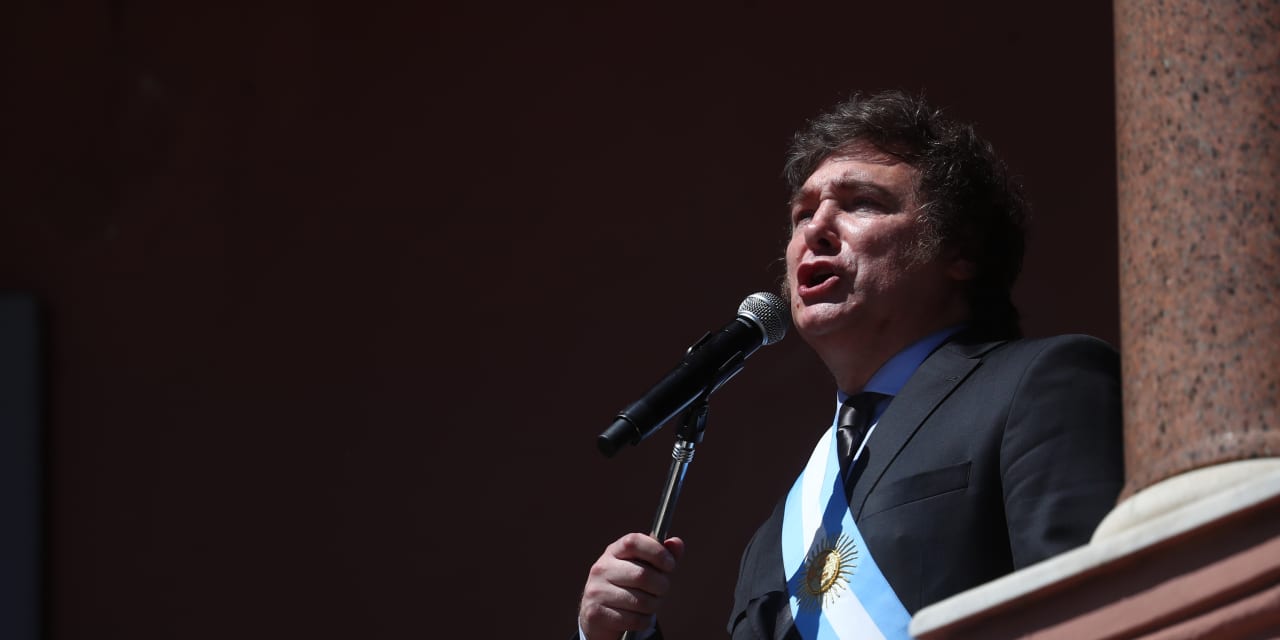Goodbye shock therapy. Hello, chain saw austerity.
That’s the label Argentine President Javier Milei’s detractors have devised for his dynamic first month in power. Investors are pleased, so far. “The probability of success for Milei is larger than of failure,” says Alejo Czerwonko, chief investment officer for emerging markets Americas at
Global Wealth Management.
Argentina’s hard-currency bonds, trading below 30 cents on the dollar before Milei’s November election, have risen to the mid-30s. He took office Dec. 10.
Milei promised root-and-branch reform of an Argentine state whose deficits are pushing inflation past 100% annually, and overregulation makes it “asphyxiatingly difficult to do business,” in Czerwonko’s phrase. He is trying to deliver.
Two days into his term, the new president cut the official exchange rate of the peso in half, bringing it closer to a market-driven “offshore” rate. He followed that with a Decree of Necessity and Urgency that would abolish controls on food prices and rents, loosen labor restrictions, and prepare all state companies for “future privatization,” among other measures.
Advertisement – Scroll to Continue
Economy minister Luis Caputo unveiled a package of tax increases and spending cuts to shrink Argentina’s budget deficit by 5% of gross domestic product, theoretically yielding a “primary” surplus (not counting debt service).
Caputo started the new year by dangling a $71 billion swap program for peso-denominated bonds maturing this year. While few foreign investors hold this paper, a successful multiyear restructuring would show competence from the new government, says Gustavo Medeiros, head of research at Ashmore Group. “Debt rollover is an important part of the stabilization plan,” he says. “You won’t have a debt crisis looming every three months.”
Milei, who ran as a lone-wolf maverick, has smoothly allied himself with the forces of Argentina’s last right-leaning president, Mauricio Macri. That’s produced a seasoned cabinet headed by Caputo, who was a minister and central bank chief under Macri. It’s also brought Milei within hailing distance of majorities in Congress. “Without the Macri team, Milei is nothing,” says Thierry Larose, portfolio manager for emerging markets local debt at
Advertisement – Scroll to Continue
Weather is on Milei’s side, too. A drought last year shaved 2.5% off GDP in agriculture-intensive Argentina, according to the International Monetary Fund. That could bounce back this year.
That doesn’t make rescuing Argentina easy. “Argentina has been chronically overspending since Juan Peron took power in the 1940s,” Medeiros says.
Milei’s emergency decree may survive because it stays in force unless both houses of Congress vote to annul it, Larose says. The budget cuts, and a 664-point “omnibus law” aimed at structural change, face more aggressive Congressional horse trading.
Advertisement – Scroll to Continue
Chain-saw austerity will make things worse for most Argentines before they get better, as Milei acknowledges. Doing away with the managed peso, and slashing subsidies on fuel and other necessities, will accelerate inflation in the short term.
Protests have so far been muted by local standards. Unions will test their strength with a general strike called for Jan. 24. “A big question mark is whether the government will be able to control the social situation,” UBS’ Czerwonko says.
Argentina’s bonds aren’t priced for perfection, though. They aren’t even priced for being serviced to maturity. “The question is when the next restructuring comes and what the recovery rate will be,” Larose says.
He sold the bonds when they rallied near 40 cents on postelection euphoria. But “we’re close to a new entry point now.”







